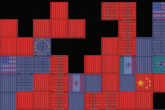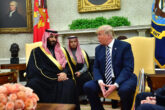March 15, 2019
Cuba: The Next Rift in the Transatlantic Relationship?
The Trump administration is poised to open a significant new rift in the transatlantic relationship, this time regarding Cuba. With the administration’s announcement on March 4 that it will allow lawsuits under Title III of the Libertad (Helms-Burton) Act of 1996 to move forward against entities in Cuba controlled by the military and intelligence services, it is one step closer to opening up a floodgate of litigation aimed at European businesses and others who hold contracts in Cuba. Europeans are angry that the U.S. administration may seek to constrain their operations in Cuba and dictate what their companies can do on the island.
So far, the measure is largely symbolic, as the lawsuits do not extend to companies engaged with these Cuban entities. The waiver for these companies will be revisited in April, however, so they could soon be exposed.
The last time the U.S. government attempted to allow lawsuits on foreign companies in Cuba under the Helms-Burton Act, a number of U.S. allies, including the European Union (EU), Canada, and Mexico, reacted furiously to what they viewed as the extraterritorial nature of the law. They imposed “blocking” statutes that prohibited companies within their jurisdictions from complying with the law’s provisions.
The European Commission also initiated action against the United States at the World Trade Organization (WTO), arguing that the provision violated WTO rules. This blowback by some of the United States’ closest partners caused the Clinton administration to decide the diplomatic headaches were not worth it. It issued a Title III provision waiver, which has been routinely renewed every six months since, including three times under the Trump administration.
But the Trump administration appears to have changed its mind. Over recent months, it has sought to increase pressure on Cuba, branding the country part of a “troika of tyranny” in Latin America and calling it out for its “indefensible support for increasingly authoritarian and corrupt regimes in Venezuela and Nicaragua.” So far, the U.S. government has only made small tweaks to toughen Cuba policy, including narrowing travel restrictions and prohibiting business by U.S. companies with Cuban military and intelligence service-linked entities.
What the Trump administration is now inching toward – allowing lawsuits against companies operating in Cuba – would be a major change. The administration could allow these lawsuits against “any person that ‘traffics’ in property which was confiscated by the Cuban Government on or after January 1, 1959.” Even in a narrow rendering, with only a partial end to the waiver, this could potentially allow a significant number of the almost 6,000 cases officially certified by the Foreign Claims Settlement Commission under its Cuban Claims Program to proceed. It could also open the gates to other claimants that were not eligible under that program.
To be clear, allowing even a portion of these cases to proceed would have important consequences. The courts would be inundated with a number of high-value claims (claims under the Foreign Claims Settlement Commission are estimated at $8 billion with interest today), and with the blocking statute still on the books European companies may be prohibited from complying with court orders or feel compelled to counter-sue for damages. This, combined with the complex nature of the claims, means that many claims could take years to resolve. European hotel chains with management contracts in Cuba, port operators, logistics companies, and others could all be exposed. They would be outraged, and this would become a significant irritant in the transatlantic relationship.
It seems like the Trump administration is spoiling for a fight with the EU over Cuba policy. Representatives of the EU and others have actively attempted to persuade the Trump administration not to allow the Title III lawsuits. They argue that these would be extraterritorial and that the United States should have no business telling their companies what to do. Despite this, the administration may relish the thought of an almost inevitable WTO fight, or even view it as another leverage point in its ongoing trade war with the EU and other allies.
Ultimately, in the face of a host of new Cuba lawsuits, the EU would push back. At a minimum it could seek global support for a WTO effort, and possibly could look to retaliate further against the United States by reviving options from last time including implementing potential visa restrictions or creating a watchlist of U.S. companies filing suits against European firms. Nevertheless, though some European companies may be willing to dig in and face a long, expensive legal battle, others would have second thoughts on whether to enter or stay in Cuba.
This looming standoff comes at a time that the U.S. government needs the support of the Europeans on Venezuela to show a unified front against the Maduro regime. Cuba provides significant medicine and medical services to Venezuela in exchange for subsidized oil, so the Trump administration sees pressure on Cuba as leverage in Venezuela. The need for a unified stance is especially true given that strong sanctions have not managed to dislodge the Maduro government yet, and with opposition leader Juan Guaido – whom the United States and many European countries have recognized as the rightful president of the country – recently returning to Venezuela to continue to build support for his position. Many of the Trump administration’s key advisors have a hardline view toward Cuba and firmly believe increased pressure will help advance their goals in the region. They won’t back down even if they are courting significant new stress in the transatlantic relationship. That may make success in Venezuela policy harder and leaves the difficult job of cultivating trust, credibility, and cooperation between the United States and European allies to others, or a successor administration.
More from CNAS
-
Game Over?
The trade wargame suggests that sustained high tariffs could create leverage and urgency to spur action toward a productive restructuring of the international trade system....
By Emily Kilcrease & Geoffrey Gertz
-
Middle East Security / Energy, Economics & Security
Trump Inks $600 Bn Deal In Saudi Arabia | Musk, Blackrock CEO Flank Trump In Gulf VisitIn today's episode of India Global, U.S. President Donald Trump secured a $600 billion commitment from Saudi Arabia on Tuesday to invest in the United States. NDTV's Gaurie Dw...
By Daniel Silverberg
-
Energy, Economics & Security / Technology & National Security
Tariffs and Tech: An Uncertain RecipeHigher tariffs could prompt American cloud companies to shift more of their capital investments abroad....
By Pablo Chavez
-
Trump Tariffs: How Will U.S. Plans Reshape the Global Economy?
Donald Trump says he's already decided the tariffs he will impose on countries that export goods to America, including the United Kingdom. Channel 4 hears from Emily Kilcrease...
By Emily Kilcrease




